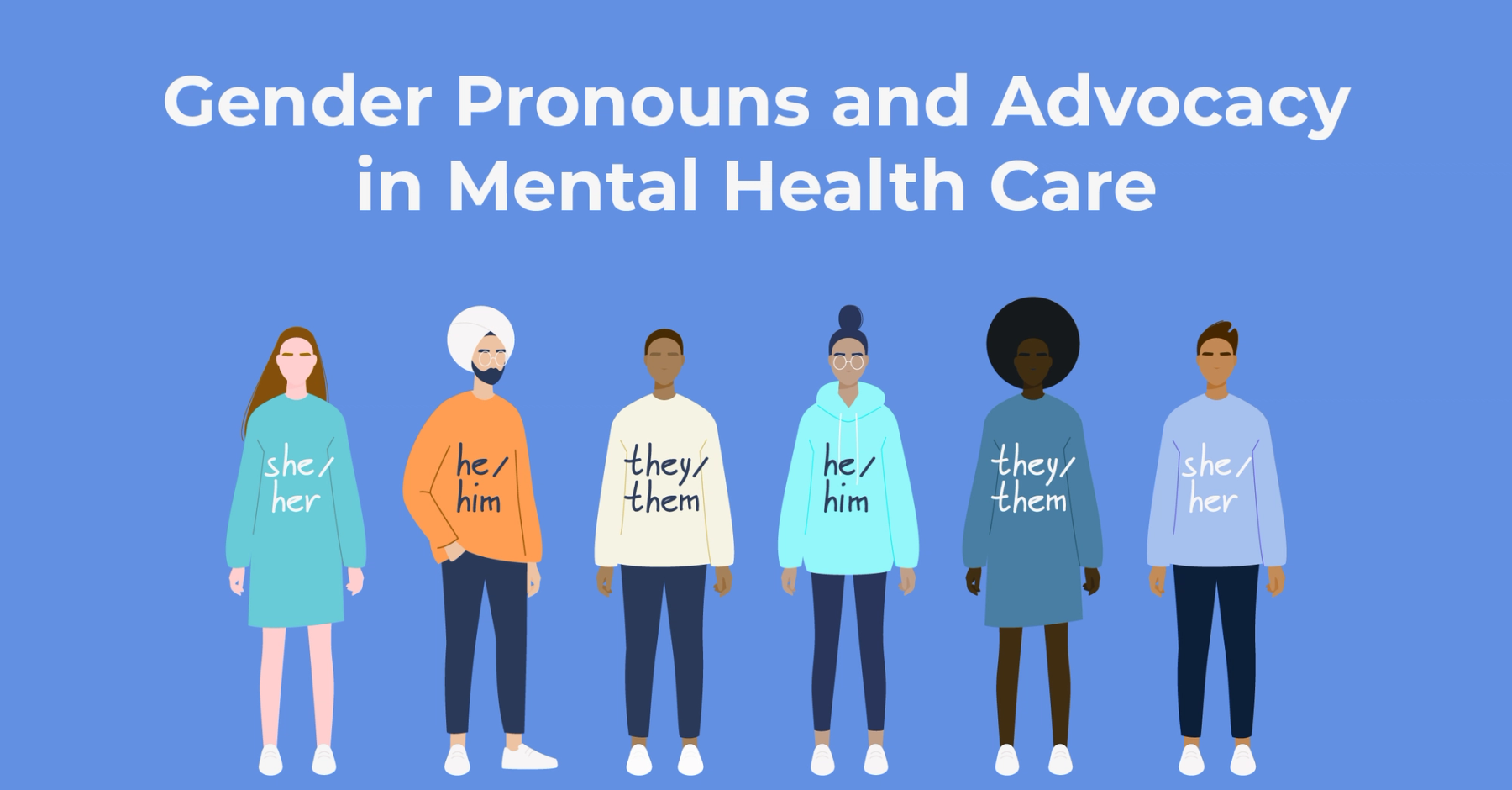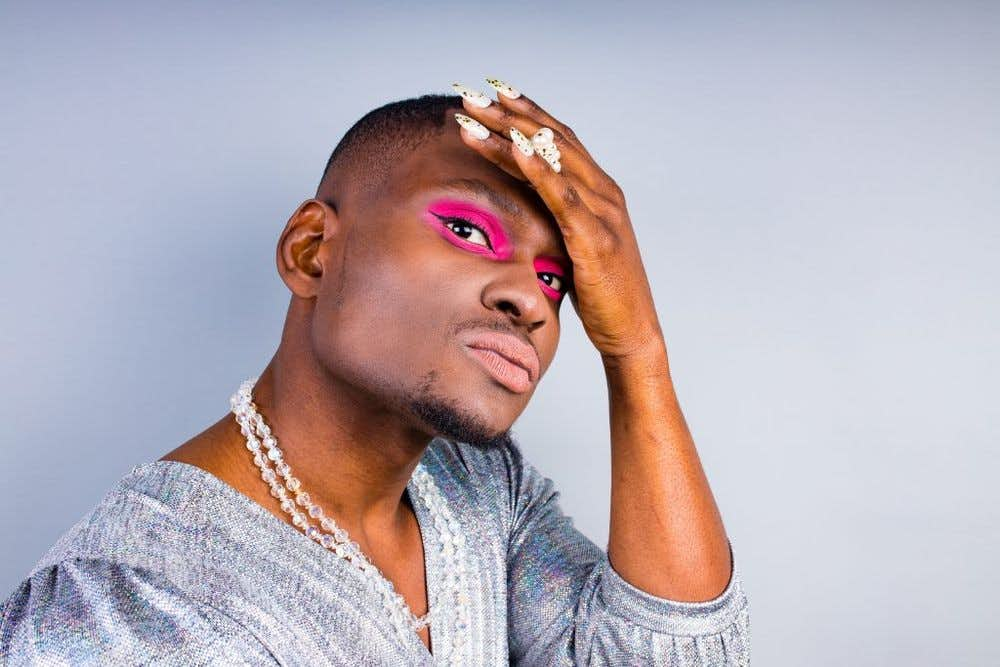July 28th, 2021

Gender pronouns are any set of pronouns that an individual wants others to use to reflect that person's gender identity. When we use terms such as she, he, her, him, they, them - we are using a person’s pronouns.
While pronouns are a way we can categorize those around us, most of us don’t stop to consider that perhaps the way we see someone, isn’t necessarily aligned with how they identify themselves.
So what happens if a person’s identity is different from how the world identifies them, and how can affirmation of a person’s identity lead to better mental health outcomes?
Gender goes beyond the organs a person has on their body. Rather gender is how one can identify.
Some people are born the same biological sex that they also identify with, therefore they would use the corresponding gender pronouns. However, that isn’t always the case for everyone. That is why we would use pronouns based on the gender someone identifies with or pronouns that indicate they are non-binary, or gender-neutral.
Non-binary, referring to people whose gender identity falls outside of the gender binary (male/man or female/woman).
Pronouns go beyond just general politeness. When we are using pronouns that someone has asked us to use, this oftentimes comes from someone who has spent at least part of their life in a body they didn't identify with and has had to work hard to come to a place where they feel comfortable enough to ask others to identify them by their correct pronouns.
Clarity Clinic therapist, Tara Javidan, LCPC, CADC shares, “I have worked with many young clients who would only use their pronouns with a few certain friends and in the safety of a mental health facility.
They would be in agony over wanting/needing to tell their family that they identify with a different pronoun than their family has been referring to them as (the wrong pronoun).”
She believes that there is no reason why everyone should not be afforded that same respect.
Using a person’s correct pronouns fosters an inclusive environment and affirms a person’s gender identity.

Gender-neutral or gender-inclusive pronouns are any pronouns (they, them, their, everyone, someone, this person, zir) that do not specify a gender unlike using she/her him/he, which would specify gender.
We would use gender-neutral pronouns anytime we are referring to someone who identifies as non-binary, or genderqueer, meaning they do not exclusively identify as man or woman. We may also use gender-neutral pronouns when we are unsure of how someone identifies their chosen gender.
While for some people in the United States who only speak the English language, this may seem difficult to adapt to, it is quite common in other languages to be identified as genderless.
Therapist Tara Javidan, LCPC, CADC shares “Farsi is my 1st language. Farsi, like many other languages in the Middle East and Southeast Asia, is considered genderless. In Farsi, we don't add gender when referring to a person, we only say this person, that person.
We also have a singular term (ze hir) for a person that is similar to how we use her/he/she/him but it is genderless. It refers to any person, regardless of gender identity, that we would be talking about.”

Mental health providers are who people come to when they have been hurt, misunderstood, labeled, and/or traumatized by others. Therefore, they have a duty to their clients to ensure that they do not add to their pain.
For clients who identify as nonbinary, transgendered or genderqueer some of that pain could be from living in a world that has not accepted them.
According to Director of Therapy, Elizabeth Black, LCPC “gender-affirming care is providing medical and mental health care in an environment that supports a full variance of gender identity and expression.
It is important to create behavioral health environments that are safe and caring spaces for folks to explore their gender and feel respected and validated when they share who they are with their healthcare providers.
In practice, gender-affirming care includes normalizing sharing pronouns, respecting people’s pronouns, not assuming someone's gender or sexual orientation, and advocating for social justice.”
In contrast, gender non-affirming health care is when your provider doesn't ask or refuses to acknowledge a person's gender identity, especially if it is different from their sex assigned at birth.
Transgender is usually used to describe someone whose gender identity and expression do not match their assigned gender at birth.
Transgendered inclusive mental health services mean that for facilities like Clarity Clinic, even if one of our therapists doesn't specialize in working with transgendered clients, they still have been equipped with training that allows them to be transgender-inclusive.
The World Professional Association for Transgender Health (WPATH) offers guidance under their Standards of Care (SOC) for the Health of Transsexual, Transgender, and Gender Nonconforming People.
Mental health providers should consult the Standards of Care to meet the diverse health care needs of transsexuals, transgender, and gender-nonconforming people.
WPATH states that regardless of a person’s reason for seeking care, mental health professionals should have familiarity with gender nonconformity, act with appropriate cultural competence, and exhibit sensitivity in providing care.

The healthcare industry is in the early stages of making the changes needed as a medical community to be inclusive to everyone based on gender/race/sexuality/weight/socioeconomic status.
Betsey Zemke, LSW suggests “health professionals can improve LGBTQIA+ health care by helping create many opportunities for a patient to share their pronouns and gender identity in a low-pressure way.
Introducing themselves and other providers using pronouns can help patients feel comfortable sharing theirs.
Remember that exploring our own gender identity takes time, and it's not a linear process for any of us.
Our gender will be strongly influenced by our age, our ethnicity, and our religious and cultural backgrounds. Particularly in that context, we can’t tell from the outside how someone else identifies, or how their identity will develop over time.
Remembering someone else's pronouns is a basic sign of respect, and it's not the only way to increase comfort for folks who are gender diverse. Reaching for gender-neutral terms like "sibling," "parent," "spouse," "child," can help people who are non-binary, mid-transition, or exploring gender to feel included and welcomed.”
Written By: Ruby Maskey
At Clarity Clinic, we have highly trained staff who specialize in psychotherapy and psychiatry services. To learn more about how we can support your mental health, call Clarity Clinic on (312) 815-9660 or schedule an appointment today.
Our Services
Virtual/Online CarePHP and IOPAdult PsychiatryChild & Adolescent PsychiatryAdult TherapyChild & Adolescent TherapyCouples CounselingFamily TherapyGroup TherapyPsychological TestingTranscranial Magnetic Stimulation (TMS)